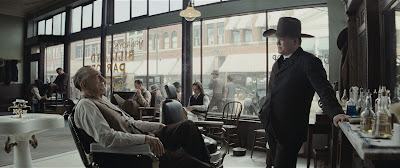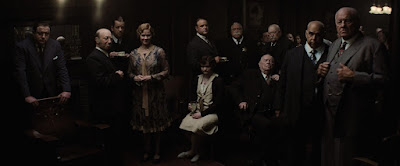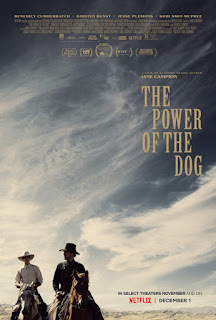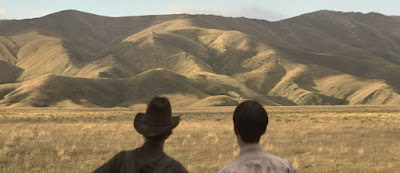or
"You Never Know What's Coming Around the Next Corner."
There was part of me that wanted to write a long preamble prior to watching Alex Garland's Civil War and lead with that. I'm glad I resisted that idea. Because if there's one thing I've learned about Alex Garland is that he never makes the movie you expect he's going to make. That was true of Ex Machina and Annihlation and Men. None of those—two of them sci-fi and one out-and-out horror film—defied expectations and were something completely different from either your expectations or experiences. You may come out confused, or disoriented, but you would hardly be bored.
You might even walk out pissed off.
But, not bored.
You might even walk out pissed off.
But, not bored.
But, Civil War is not science fiction, it's speculative fiction (and oblique speculative fiction, at that)...there's no fancy technology—this war is conducted with Humvee's, automatic weapons, and helicopters (there's not even a drone in sight!). It's speculative...but not the way you might think it is...like, with some recognizable political perspective that reflects the fractured state we appear to be in now. There's plenty of things for people to cherry-pick (we'll look at those), but just as many things to confound that perspective (we'll look at those, too).The President (Nick Offerman) is preparing a speech to the Nation about America's latest victories in the war with the "Western Front"—a group of secessionist states at war with the government. "It is," in his words, "the greatest victory in the history of military campaigns."
That's hardly "The War to End All Wars" language. But, it is enough to raise literal questions among a quartet of journalists embarking to set off to Washington D.C. to try to interview the President, despite POTUS labeling the press as "enemy combatants." The group is Sammy (Stephen McKinley Henderson), a veteran reporter who writes "for what's left of The New York Times" and who labels the President's latest announcement as "nothing, he could have chosen words at random; Joel (Wagner Moura), a war correspondent from Reuters, who seems to have a "jones" for being in the thick of the action; Lee Smith (Kirsten Dunst), a award-winning photojournalist, also from Reuters; and Jessie (Cailee Spaeny), a young up-and-coming photojournalist wannabe, whom Lee saved from getting concussed by a bombing of an Environmental Protection truck at a New York City protest. Sammy walks with a cane and Lee thinks he's too old and too fat to be useful where they're going, and she's pissed at Joel for letting Jessie talk him into letting her go on their journey. She thinks all the "baby-sitting" will get in the way of getting the story.Their passengers should be the least of her worries. The 857 mile trip to D.C. will be littered with evidence of a country in crisis. Major highways are clogged with abandoned cars, shopping malls appear to be ground-zeros for attacks with crashed choppers in the paring lot and the ubiquitous short-stay high-rise hotels are chunked by missile damage. Tracers dot the skies at night amid the muffled reports of automatic weapons fire. Snipers occupy roof-tops, and an abandoned stadium is a handy, if crowded refugee camp for Americans bombed out of their living quarters. Spielberg tried to depict the concept of "American refugees" in his version of War of the Worlds, but Garland's version has all the verisimilitude of the nightly news, only a bit tidier.So, what happened to us? Nothing is spelled out—we aren't given a long opening crawl to read at the beginning—we're just plopped down in the middle of the chaos (not unlike Haskell Wexler's Medium Cool) to learn what we can. Some of it sounds plausible: possible questions the group might ask when they reach their destination are tossed around like "Mr. President, do you have any regrets during your third term?" (third term?) "How about your dismantling of the FBI?" "Do you regret ordering air-strikes on American citizens?" When they stop to get gas, the surly militia guys guarding the pumps won't fill the tank for $300...but they will for $300, "Canadian."
But, there are disconnects that take you out of direct parallels: Lee is most famous for "the legendary picture of 'the Antifa massacre'." The "Western Forces" moving into Washington D.C. are a combined unit of the states of California and Texas (with reinforcements from the "Florida Alliance"). Both of those concepts jolt you out of thinking Civil War has anything to do with reality, but its concept of a trigger-happy America with grudges around every corner skews a bit closer to the home we know. As is the section where they drive through a seemingly normal rural town—reminded that there's a civil war going on, a shop-clerk says "we try to stay out of it" while the roof-tops are scouted by snipers.
The civil war isn't really the focus of the movie, either, but the back-drop in which reporters have to thread their way through "unprecedented times" to "get the story." And record truth in the same way they record conflicts in foreign countries. The good and the bad, but mostly bad. And they do it unblinking because someone has to look. And tell the tale. So others can decide. Although Lee admits that when she was covering foreign hot-spots, she was hoping to send home the message "Don't Do This."
"Processing..."
For however preposterous the particulars, the general idea is that it can happen here...and might. And then the Constitution starts shredding, as people start to force their own interpretation on others. There is one cracker-jack of a scene—at some point it'll show up as a Sunday "Don't Make a Scene"—that features an un-billed Jesse Plemons as a militiaman in charge of a dubious operation that the quartet stumble upon that quickly escalates to a hostage situation, the "Are you American? What kind of American are you?" scene that is only hinted at in the trailers. He's crossed over where he doesn't need to know particulars ("Reuters? What's that?") nor does he care to learn. He makes decisions cavalierly and unhesitatingly and doesn't care if he makes a mistake—he'll just bury it. Plemons is so good at playing casually dangerous that the scene crackles with the authenticity of a body-cam and with escalating horror. Yeah, it could happen. It could definitely happen.If there's a fault to be had, it's of the "Chekhov's Gun" variety—things talked about in the opening become significant in the second and third act as the stakes build. But, one can concede the point that this is veterans talking about the dangers and imparting wisdom to uninitiated. They impart that wisdom in the hope that it doesn't happen. But, it's happened before, so they talk about it, knowing full well that what's happened before...The movie ends when the particular goals are met and things achieved. But like most Garland movies, it leaves you asking "What Happens Next", although the most typical scenario is discussed—as if by order of Chekhov. But, that is not Civil War's concern. It rack-focuses your mind back to the journalists and what has just transpired because at some point the movie has to end, and one is left contemplating the "Who" and the "What" and the "When" and the "How."





























.jpg)
































